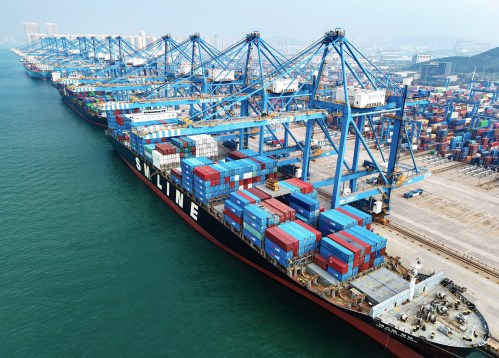Main topic: President Joe Biden's executive order on limiting American investment in certain Chinese tech firms.
Key points:
1. The executive order aims to address national security concerns related to companies dealing with sensitive technologies like semiconductors, quantum computing, and artificial intelligence.
2. The order is narrowly targeted to bar funding of entities engaged in specific activities that pose acute national security risks.
3. This is not the first time the US has sought to limit the influence of Chinese tech firms, with previous restrictions on Huawei, supercomputing technology sales, and pressure on ByteDance to sell TikTok.
Former Treasury Secretary Larry Summers warns that China's economy is hitting a wall and that US GDP is set to exceed China's for another generation, highlighting the need to be vigilant about the Chinese geopolitical challenge.
China's economic weakness may pose challenges for developing economies and regions that rely on it, but the US economy is well positioned to navigate these headwinds with its investments and resources, according to US Deputy Treasury Secretary Wally Adeyemo.
China defends its business practices and claims that most U.S. firms want to stay, despite Commerce Secretary Gina Raimondo stating that China has become "uninvestible" due to fines, raids, and other actions that make it risky to do business there.
China's economic tactics, including BRICS expansion, are aimed at challenging the US economically rather than engaging in a war, according to US presidential candidate RFK Jr., who believes China wants to bury the US on an economic playing field while still relying on it.
The US Treasury Secretary, Janet Yellen, expressed concerns about China's economic challenges and its potential impact on the global economy, while also noting that China has the policy tools to address these challenges.
Vice President Kamala Harris emphasizes that managing the US-China relationship involves de-risking and understanding rather than decoupling, emphasizing the need to protect American interests and lead in setting the rules of the road.
President Joe Biden is seeking to counter China's influence in the developing world through high-profile meetings during his trip to India and Vietnam, emphasizing that the US is a trustworthy partner without wanting a new Cold War, but signs of geopolitical fractures remained evident.
China's economy has consistently outperformed other major economies in the past four years, but the US is spreading false narratives and propaganda to hide this reality, according to John Ross, former director of economic and business policy for the mayor of London. The US has two motives: discouraging foreign investment in China and influencing China's political and economic policies.
US President Joe Biden believes that China's current economic crisis will prevent them from invading Taiwan, as Chinese President Xi Jinping is preoccupied with handling economic issues and is unlikely to have the capacity for aggression towards Taiwan.
The United States and Canada's top cybersecurity officials express concern about the formidable threat posed by China.
China's military buildup is a preparation for a potential war with the United States, according to Air Force Secretary Frank Kendall, who emphasized the need for America to optimize its forces to counter this rising threat while acknowledging that war is not inevitable.
The United States may not be prepared for a potential conflict with China, warns Air Force Secretary Frank Kendall, emphasizing the need for deterrence and major changes to optimize the Air Force and Space Force.
The Biden administration plans to increase scrutiny of foreign-owned companies' investment plans in the United States, with a focus on national security concerns and potential risks related to China.
Top Republican warns that President Biden's border policies are allowing Chinese spies to infiltrate the US and pose a long-term threat to national security.
U.S. Treasury Secretary Janet Yellen believes the U.S. economy is on a path of sustainable growth and can withstand near-term risks, including a potential government shutdown, a United Auto Workers strike, student loan repayments, and spillovers from China's economic challenges. Yellen emphasized the importance of addressing these headwinds while maintaining a strong labor market and consumer spending. She also expressed the Biden administration's intention to de-risk supply chains that overly depend on China without seeking to decouple entirely from the Chinese economy.
Treasury Secretary Janet Yellen states that U.S. growth needs to slow to its potential rate in order to bring inflation back to target levels, as the robust economy has been growing above potential since emerging from the COVID-19 pandemic. Yellen also expects China to use its fiscal and monetary policy space to avoid a major economic slowdown and minimize spillover effects on the U.S. economy.
China's slowing economic growth under Xi Jinping's centralization policies could lead to resistance and expose divisions within the country, potentially threatening the CCP's power, according to former White House official John Bolton.
Geopolitical tensions are identified as the biggest threat since World War II, while JPMorgan CEO Jamie Dimon argues that China is not as significant a threat to the U.S. as commonly believed.
China's economic troubles and increasing state intervention in the private sector make it a potential danger to its neighbors, heightening tensions with the United States and its allies, and increasing the risk of war over the next decade.
U.S. Treasury Secretary Janet Yellen warns that the United States is too reliant on China for critical supply chains, particularly in clean energy products, and needs to diversify its sources of supply.
A senior Chinese envoy to the US dismissed Washington's suspicions of Beijing's intentions, stating that the concept of "win-win" in their bilateral relationship is "bullsh*t" and that they don't trust the Americans due to export restrictions and sanctions.
The U.S. administration under President Joe Biden aims to restrain China's AI development, considering it a potential threat.
